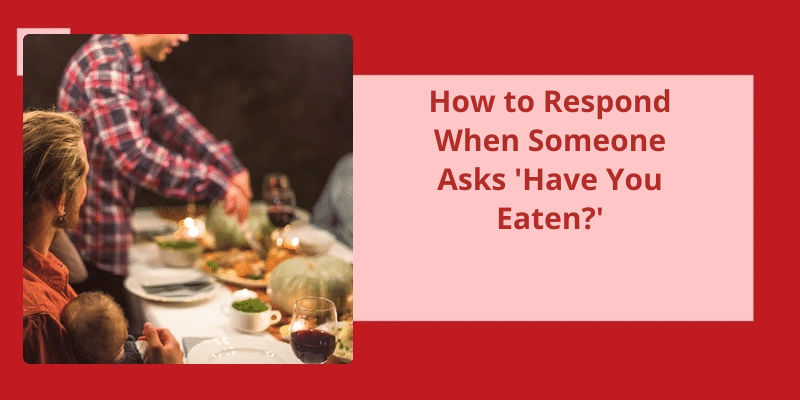Food is an integral part of human existence. It sustains life, nourishes the body and provides satiation to the soul. So when someone asks you whether you’ve eaten, it’s a gesture of kindness and concern. It shows that the person is looking out for your well-being and wants to make sure that you’ve taken care of yourself. The question might seem simple and straightforward, almost like a reflex action, but it carries a lot of significance. It signifies the importance of social interaction and the value of small talk. So how do you reply when someone asks if you’ve eaten? The answer is quite simple, "Yes, I've already eaten."
How Do You Respond to Did You Eat?
The question, did you eat is often asked as a common greeting or an inquiry into someones well-being. Depending on the context of the situation, one can respond in several ways. Technically, the answer should be a simple yes or no, indicating whether or not the person has eaten. However, the context of the conversation can change the meaning of the question.
However, if the person asking is trying to invite you to eat, then a more nuanced response might be appropriate. Saying no, I havent eaten could be interpreted as an invitation to eat together, while saying yes, I’ve already eaten might imply that you aren’t interested in joining them.
It’s also worth considering the implications of responding to did you eat with no, I havent. It may imply that you’re going to eat soon, which could lead to further questions about what you plan to eat. If you don’t want to share your eating plans or preferences, then it may be better to respond with a simple yes or no.
If youre looking for a more polite way to ask someone if theyve eaten, then have you eaten might be a better choice. This phrasing is less direct than did you eat and indicates that you’re asking out of concern or as part of a casual conversation.
In general, the way you respond to did you eat will depend on the context of the situation and your relationship with the person asking. Whether you choose to be direct or nuanced in your response, it’s important to consider the implications of your words and the message you want to convey.
When asking someone if they’ve eaten their dinner, there are a few different ways you can phrase the question. While “Have you eaten dinner?” is a common and grammatically correct option, some people may prefer to use a slightly more relaxed tone and ask “Have you’d dinner?” This variation uses the verb “have” in place of “eat,” which is a common substitution in American English.
Is It Correct to Say Have You Eaten Your Dinner?
But it’s important to note that this phrasing is regionally specific to the United States, and may not be universally understood or accepted in other English-speaking countries. In British English, for example, “have” isn’t commonly used in this context, and “Have you eaten?” or “Have you’d your dinner?” may be more commonly heard.
When asking someone if they’ve eaten their dinner, it’s important to consider the context and the relationship between the speaker and the listener. In some cultures, asking about food consumption can be seen as intrusive or impolite.
It’s also worth noting that the time of day may influence how this question is phrased. For example, “Have you’d breakfast?” or “Have you’d lunch?” may be a more appropriate question depending on the time of day. Additionally, some people may prefer to use more informal language, such as “Did you eat yet?” or “Have you chowed down?”
Ultimately, the phrasing of this question depends on individual preferences, cultural norms, and regional variations in language. As with any language use, it’s important to consider the context and audience when choosing how to phrase a question.
The Relationship Between Food and Social Interactions, and the Role of Asking About Meals in Building Relationships
- Sharing meals is a way to bond with others and build relationships.
- Asking someone about their favorite foods or restaurants can lead to meaningful conversations.
- Food can bring people from different cultures together, allowing for a better understanding and appreciation of each other’s customs and traditions.
- Eating together can create a relaxing and comfortable environment for conversation, helping to break down barriers and foster connections.
- Trying new foods or sharing recipes with others can also be a fun and engaging way to connect and build relationships.
Now that we know what “Have you eaten?” means, let’s dive deeper into the cultural significance of this seemingly insignificant question. By understanding the different contexts in which this phrase can be used, we can gain valuable insights into various social practices and norms around the world.
What Does Have You Eaten Mean?
When someone asks you, “What’ve you eaten?” they’re essentially inquiring about the food that you’ve had during your day or the particular meal that you just had. This is a common question that friends, family, and acquaintances ask each other as a way to connect and start a conversation. Often, it’s a quick and casual question that people use to break the ice or to catch up with each others lives.
It can be an indication that someone wants to invite you out. For example, a friend might ask you what you ate for lunch, and then follow up with an invitation to try out a new restaurant that they recently discovered. This is a great way to explore new cuisines and bond over food.
At times, “What’ve you eaten?” may also be an indication that someone is worried about you. For example, if you’ve been feeling unwell or sick, a loved one might ask you about your food intake to ensure that you’re getting the proper nutrients and that you aren’t skipping meals. This can serve as a gentle reminder to take care of yourself and to prioritize your health.
It could be a friendly inquiry into what they’d for breakfast or dinner, or even an opportunity to recommend a favorite recipe or restaurant. Whatever the case may be, it’s a simple and unassuming question that can open up a world of possibilities and conversations.
It can be a simple conversation starter, a way to bond over food, or even an indication of concern. Whatever the intention behind the question, it’s always important to reply honestly, enjoyably, and with mindfulness to connect and communicate effectively.
The Cultural Significance of Food and Mealtime Conversations Around the World.
- Food rituals and beliefs in different cultures
- The role of food in social gatherings and celebrations
- The cultural importance of sharing meals with family and friends
- The impact of globalization on traditional cuisine
- The use of food as a means of cultural exchange and diplomacy
- The history and evolution of popular dishes and cuisine across cultures
Source: Is ‘Have you eat?’ a correct expression in English grammar?..
Do You Say Have You Eaten or Have You Ate?
It can be confusing to determine whether to use “eaten” or “ate” when asking someone about their meal. However, by understanding the difference between the simple past and present perfect tenses, it’s clear that “eaten” is the correct choice in this situation. The simple past tense refers to a specific point in the past, while the present perfect tense refers to an action that occurred in the past but has relevance in the present.
For example, if someone were to ask, “Have you eaten breakfast yet?”, the correct response would be, “Yes, I’ve eaten breakfast” (not “Yes, I’ve ate breakfast”). This is because the present perfect tense emphasizes the connection between the past and present, indicating that the speaker has had breakfast and it’s still relevant in the present moment.
It’s important to note that the verb “to eat” is an irregular verb, which means that it’s past participle form (eaten) isn’t formed by adding “-ed” to the end of the base form (eat). Other irregular verbs include “go” (gone), “write” (written), and “swim” (swum). By memorizing these irregular forms, it becomes easier to use them correctly in conversation and writing.
Additionally, using “ate” instead of “eaten” can signal to others that the speaker isn’t a native English speaker or isn’t fluent in the language.
In summary, the correct choice when asking someone about their meal is “Have you eaten?” and not “Have you ate?”. The present perfect tense emphasizes the connection between the past and present, and using the correct form of the past participle is key in communicating fluently in English. By being aware of irregular verbs and their past participle forms, English learners can improve their communication skills and avoid common grammatical errors.
Understanding the proper way to ask a question can make all the difference in effective communication. As such, it’s important to remember the grammatical rules that dictate how we ask questions in English. One common question is “What did you eat?” – and the reason we put it this way is due to the use of an auxiliary verb in the past tense. This keeps the main verb in the present tense, allowing us to clearly convey when the event occurred.
How Do You Ask What Did You Eat?
Asking someone what they ate can be a simple question, but it’s important to do it correctly to avoid confusion or misunderstandings. In English, the correct way to ask the question is, “What did you eat?”. The use of the auxiliary verb “do” in past tense “did” is crucial in this construction. This means that the verb used stays in the present tense. It’s essential to understand why we use this construction to appreciate how we can ask this question correctly.
Of course, this is just the beginning of asking someone about their eating habits. When we discuss food, we cant assume that everyone eats the same things. Therefore, it’s crucial to know whether someone has any dietary restrictions or preferences. For instance, asking, “What did you eat that was vegetarian?” can help tailor our food choices when we invite the person to dine with us.
By asking appropriately, we can build on asking further questions about dietary preferences and restrictions and tailor our food choices accordingly.
Asking someone what they want for lunch may seem like a simple question, but the way you phrase it can impact the overall meaning. It’s important to choose your words carefully to ensure clear communication. For instance, asking what someone “feels like eating” versus what they “want” can make a difference in their decision-making process. Let’s delve deeper into the nuances of lunchtime inquiries.
How Do You Ask What You Eat for Lunch?
When it comes to asking someone what they want to eat for lunch, there are several effective ways to phrase the question. Depending on the situation and the relationship between the individuals involved, the approach may vary. For instance, when buying lunch for a friend, it’s essential to show consideration and politeness. Hence, asking “What would you like for lunch?” is a courteous way to inquire about their preference without sounding too pushy or demanding.
On the other hand, if the person wants to convey a sense of flexibility and openness to different options, they could ask “What do you feel like eating for lunch?”. This question leaves room for exploration and experimentation in terms of various cuisines and dishes. It also offers an opportunity for both parties to find something they enjoy and can share.
For example, “What do you want for lunch?” gets straight to the point, leaving no room for confusion or misinterpretation. In this case, the response can be a simple “sandwich” or “salad,” or a more elaborate answer depending on the persons mood and craving.
For instance, if the person asking is in a position of authority or power, such as a supervisor or boss, it’s crucial to use a neutral and non-threatening tone. This way, the employee or subordinate feels comfortable expressing their preferences without fear of repercussions or judgment.
In contrast, if the conversation is between two close friends or family members, the tone can be more casual and playful. This approach allows for a more relaxed and enjoyable conversation and may lead to a more spontaneous and adventurous food choice.
Whether the goal is to show kindness and consideration, be open to different options, or get straight to the point, there’s no one-size-fits-all approach. The important thing is to be respectful, communicative, and attentive to the other persons needs and desires.
Cultural Norms and Customs Around Asking About Food Preferences in Different Countries
- In Japan, it’s customary to ask about food preferences and allergies before dining together.
- In France, it’s considered impolite to request changes or substitutions to a dish.
- In India, hosts may ask about dietary restrictions or preferences and make accommodations accordingly.
- In Mexico, it’s common to receive a variety of dishes to share amongst the table, rather than individual meals.
- In the United States, it’s typical to ask about food allergies or restrictions, but may not always be followed.
Conclusion
In conclusion, the act of asking someone if they’ve eaten is a common cultural norm that often goes beyond mere hunger. It serves as a way of checking in and showing care for the other person's well-being. While it may seem like a minor exchange, it’s these small gestures of consideration that form the building blocks of meaningful relationships and strong bonds between individuals. So, the next time someone asks if you’ve eaten, remember to respond with warmth and gratitude, and continue to foster those deep connections that make life all the more fulfilling.






